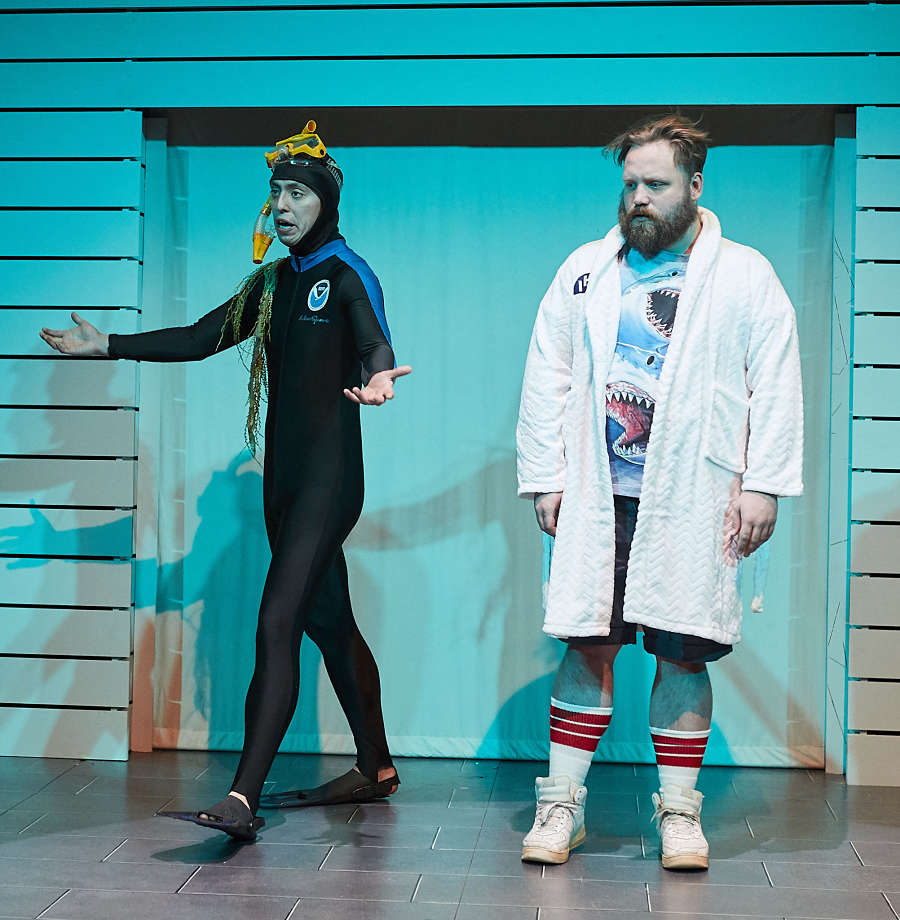It’s a cold, gray February afternoon in Makanda, Ill. I’m standing before my mailbox, sorting junk from bills and occasional correspondences with theatres or publishers. While letters from publishers nearly always contain checks (not many, but enough), most correspondences from theatres carry form letters notifying me that I’ve been rejected for various opportunities. So my trips to the mailbox, much like my role in raising my 15-year-old son, Ricky, act as a daily reminder to practice humility, patience, and perseverance.
Today’s delivery brought a different kind of energy, though: I saw the Actors Theatre of Louisville logo and didn’t want to open the envelope immediately. In truth, I was afraid of its contents.
The previous June, I had received a letter from Actors Theatre, notifying me that my 10-minute play 24 Minutes had been selected as a finalist for the Heideman Award. That letter marked a significant step forward in my development as playwright. Ever since I started writing texts that could be called plays 10 years ago, I was intent on earning a spot alongside other emerging playwrights at the Humana Festival.
The second letter, which I now held in my hands as I walked up the muddy drive, contained the answer to whether I would fulfill the personal goal I set 10 years before. Overcome by the need to know, I ripped open the envelope. My eyes were drawn to the word, “Unfortunately,” and I already knew the rest. My emotions in that moment ran the gamut: I was proud to have been named a finalist but still felt like a failure. Though I had come closer than ever to earning a slot in a production program at Actors Theatre, I wondered if I’d ever get that far in the selection process again. And though I had told myself that a rejection was not a reflection of the quality of my work, I couldn’t quiet the demon in my mind that assured me that indeed it was objective proof.
And I couldn’t escape the next inevitable question. Why keep submitting?

While playwrights are a wildly diverse bunch, perhaps the one thing we all share is that we believe in ourselves—our talents, our visions, our intrinsic value—even when no one else does. Still, after the seemingly never-ending stream of rejection letters that say otherwise, it helps when we can lean on each other. Seeking advice and inspiration, I popped questions about the submissions process to a handful of playwrights and new-play development professionals.
“I almost never submit a play to a theatre,” said playwright Chuck Mee. “I wrote plays when I first graduated from college, in the early ’60s, and we did them at La MaMa and Caffe Cino and St. Marks Church. Then I got involved in political activities that I couldn’t stop being consumed by for 20 years.”
Indeed, many playwrights found traction in the do-it-yourself model of theatre that flourished in the Village at the time. The theaters Mee mentions invited young, daring playwrights to create a new theatrical vocabulary, fueled by anti-establishment values, protest, and deep questioning of the American Dream.
Self-producing is still an option, but one that requires resources not always readily available to playwrights. For those who wish to have their work done but can’t orchestrate productions of their own work, the submissions process is still the most viable way to advance in theatre.
For artists, the often overly complicated process of submissions can be daunting. And the sheer idea of sharing your work with strangers is anxiety-inducing to many.
“Many years ago, I sent a play to a theatre, and after about a year I inquired to check on the play’s status,” said Obie-winning playwright Caridad Svich. “I was then told by someone in the office—and this was a theatre where my work had been presented before—that the script was in the trash. WTF? If an artist has worked in your building, for God’s sake, the onus is on you as a business to sustain a healthy business profile with your past clients because they could be your ‘clients’ someday again.”
Knowing that you may never get a response is disheartening. Yet many embrace the uncertainty and even lean into it. For those playwrights, rejections become the most common form of communication with theatres.
“I used to obsess in a really negative, unproductive way,” said Bruce Walsh, whose play Grown-Ass Louis won the 2017 Heideman Award. “Because the nature of submissions means that most of them will be rejected, it’s easy to live in that failure, and go around thinking you’re failing because you received five rejections that week. But now, because I do so many, there’s usually at least one encouraging response I can focus on instead.”
Carbondale-based professor and playwright Jacob Juntunen also submits a lot, but has become more strategic. “For a long time, I was making cold submissions to LORT regional theatres with my full-lengths, but I’ve gradually slowed down on that,” he explained. “My goal now is to submit to 100 opportunities per calendar year. These are generally short play contests, and I would say of those 100, I might get 3 to 5 acceptances.”
While the return of a given submission is unpredictable, submissions can lay the foundation for relationships with potential collaborators.
“I submitted my short play Saddam’s Lions to the Core Artist Ensemble at the Barrow Group Theatre in New York,” Juntunen continued. “It was accepted, and I traveled to New York City to be part of the rehearsals and see the performance. That experience introduced me to some great artists out there, and we are still in contact. I’ve had several short plays produced by the Core Artist Ensemble, and even a couple commissioned by them. And it all came from an unsolicited submission.”
While technology makes submitting to many theatres fast and easy, blind submissions aren’t the only way.
“I very rarely submit blindly to theatre companies I don’t know,” said Andrew Hinderaker, whose play Colossal won the Jean Kennedy Smith Playwriting Award in 2013. “I believe it’s my responsibility to get to know theatre companies, to develop those personal relationships with the artists who run them, and then to send work directly to the folks who might respond to it. This is hard work and takes time—it’s been over a decade fostering those relationships. But I also find it much more rewarding than blind or agent submissions.”
Those relationships are key, not only to our lives as professionals but also as social creatures. We need to feel as though we are part of a community. But how does a playwright cultivate relationships with theatres and the people who work in them? There are many paths, but for playwrights who wish to develop relationships and learn about the playwriting craft, reading scripts for a literary department can provide opportunities to do both.
“I think one of the greatest things a playwright can do is actually work in a lit office,” Hinderaker continued. “In 2007-2008, I worked as a script reader for Victory Gardens (for Aaron Carter) and for the Goodman (for Tanya Palmer), and it totally opened my eyes to how bombarded theatres are with script submissions, how hard lit managers, directors of new-play development, and artistic directors work to stay on top of their reading piles, and how impossible of a task that is.”
While some literary managers can be as reclusive as Thomas Pynchon, most aren’t always so reticent. It’s easy to imagine them as gatekeepers, but we should consider that most people in literary departments are there because they love plays and playwrights.
“Developing a relationship with writers over time is as much a part of my job as is reading submissions,” said Actors Theatre of Louisville literary manager Jenni Page-White. “I prefer to think of myself as a play or playwright advocate rather than a gatekeeper. The best part of my job is when all the various considerations that go into programming a season align, and we’re able to produce a play that I’ve been fired up about for months.”
“I have the best job in the American theatre,” enthused Nan Barnett, executive director of the National New Play Network (NNPN). “Advocacy for the field, its practitioners, and its products is my responsibility and privilege. I spend every day thinking, talking, reading, and writing about new works and those who bring them to life. I facilitate meetings with playwrights, producers, and theatremakers to create colleagues and collaborations so that new scripts come off of the page and onto a stage.”
Most playwrights I interviewed for this article praised the NNPN, which not only helps set up rolling world premieres of new plays but created the New Play Exchange, an online digital library for new works, to address the submission/rejection cycle. At the time the NPX was started, many American theatres had stopped accepting unsolicited scripts. Playwrights were unhappy because they couldn’t get their works read, theatres were overwhelmed with plays that didn’t fit their needs, and literary managers were unhappy with the methods available to them for discovering, procuring, and tracking scripts.
“So we wanted to make sure that theatres that didn’t have the infrastructure necessary to solicit, read, file, and maintain a script library had access to the new plays that would speak to their artists and audiences,” Barnett explained.
While the field is more saturated than ever, those who push through the years of mastering one’s craft while developing relationships with theatres and theatremakers can eventually find ways to get their work seen. With the right combination of skill, knowledge, perseverance, and luck, development opportunities and productions are attainable.
Brian James Polak, playwright and artistic director of Jedlicka Performing Arts Center (and host of AT’s podcast the Subtext), submitted his first full-length play to a well-known conference, only to be rejected. “But then one of the readers contacted me a couple months later,” said Polak. “She said she loved my play and wanted to know if I was interested in working on it with her.” According to Polak, the ensuing collaboration led to his getting accepted into a major festival, and then using the same play to get into grad school. “If I didn’t submit that play for that first opportunity, I might not be where I am today,” Polak added.
Svich has a similar tale of serendipity: a play she’d sent and had been rejected outright somehow “found its way into the hands of the artistic director at that same theatre. Rescued from the slush pile? Trash bin?” She doesn’t know, but says that when she received a phone call from the A.D. saying they wanted to produce the play in their upcoming season, “At first I thought I was receiving a prank call, because how could the A.D. not know the script had been ‘passed over’ by someone in their office? But they didn’t. And they did the play.”
Mee has an even more circuitous case study in happenstance. After he returned to playwriting in the ’80s, he gave his first new play to a friend at the print shop where he photocopied his plays.
“I had become friends with a guy who worked in the local shop where I’d been xeroxing my political activist crazy writing,” said Mee. “So I took my play to him and asked: ‘Do you know what I could do with it?’ And he said, ‘Oh, I’ll give it to my friend Joe Papp.’ That was Wally Shawn. And Joe Papp called me a few days later and said he wanted to do it. So that’s how I learned: Never do anything with a new play except to give it to a friend.”

After reading that rejection letter from Actors Theatre of Louisville, I wasted a few hours wallowing in despair, wondering if I’d ever “make it,” blaming my rejection on things beyond my control for the rejection. All it made me want to do was give up. But I still have plays to write, and people who want to read my new work—people who, sooner or later, may invite me to collaborate with them. With every opportunity that I have earned, I’ve found myself in an itinerant community dedicated to bringing the work to life. Those communities, whether short- or long-term, are far more important to me than winning awards or achieving commercial success. By giving up, I would only ensure that none of my plays would ever be read, or seen, by anyone.
Instead I’ll keep working, sharing, and searching for my people. As Beckett might have written: I can’t go on submitting, I’ll go on submitting.
CORRECTION: An earlier version of this story omitted the photo credit for the opening image.


